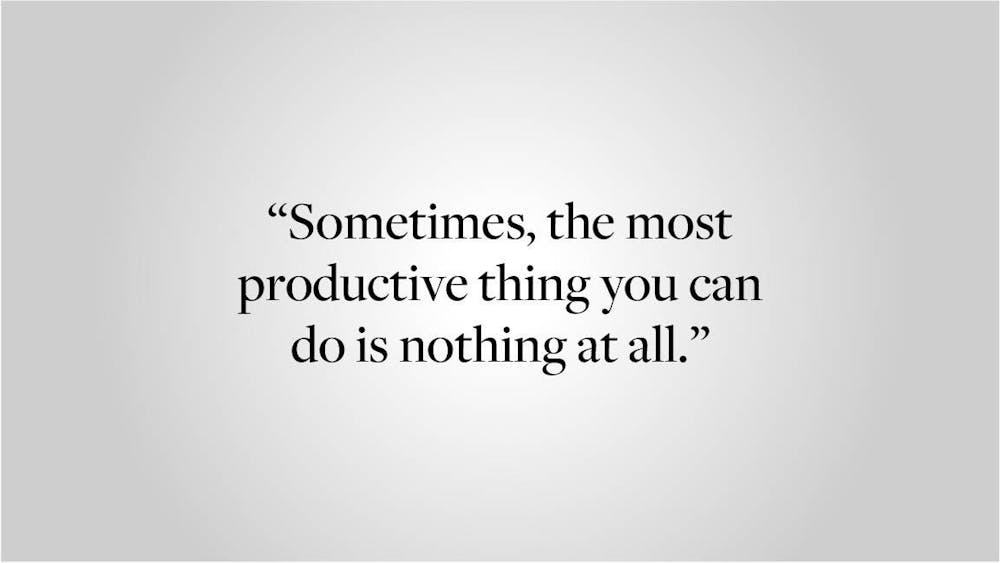Go on YouTube. In the search bar, type “productive college day in my life.”
In seconds, you will see hundreds of videos meant to be inspirational: “study diaries | college days in my life, library, productive study vlog,” “an early & productive college day in my life (waking up at 5am),” “another early 7am productive day in my life.” YouTube has an entire subgenre of hardworking students who wake up early in the morning and then study past midnight — without ever stopping.
These “study with me” videos seem to be an attempt at nudging viewers toward a more productive lifestyle. But if you are someone like me, watching these students may sometimes bring you guilt. When I watch these videos while taking a break, they often make me wonder whether I am wasting my time and should be working instead.
Productivity culture, or hustle culture, is a societal pressure to maintain a high level of productivity. It demands that you are constantly working — whether that be in the context of your job, school or personal goals. It glamorizes the idea of overworking yourself, telling you that your self-worth is measured by how productive you’ve been. It’s a voice inside you that says, “No, you cannot feel good about yourself until after you have checked off your to-do list.” As you lay in bed, scrolling through posts about people who work 12-hour days, productivity culture screams at you to get up and get to work.
There is nothing wrong with pursuing a productive lifestyle, but a problem arises when our need to continuously accomplish something becomes our ultimate priority. Relaxation, despite being essential to our health, is often frowned upon. Instead of feeling rested from taking time off work, we end up feeling guilty. Yet it is integral that we prioritize our own relaxation to avoid the detrimental effects of hustle culture.
Living a busy lifestyle has become an “aspirational status symbol,” according to a series of studies published by Columbia Business School. Researchers found that individuals that appear to lead overworked lifestyles are perceived as higher in status and human capital characteristics such as competence and ambition. For example, participants in one study were assigned to read Facebook updates from a hypothetical friend. Participants saw either all busy updates — “quick 10 minute lunch” or “oh I have been working non-stop all week” — or all leisurely updates — “enjoying a long lunch break” or “I haven’t worked much this week, had lots of free time.” Then, participants were asked to rank this friend across various characteristics: social standing, human capital, demand in the job market and more.
Researchers discovered that the friend was perceived as higher in social status and desired human capital characteristics by participants who saw busy Facebook posts. Participants that saw the busy posts also ranked the friend as more in demand. The results demonstrate a societal attitude that assigns higher status to busier individuals.
However, attributing status to productivity is problematic, especially in the workplace. Instead of encouraging people to work harder, an obsession with productivity leads to burnout, which can contribute to further physical and mental health issues such as heart disease, diabetes and depression. Moreover, a work culture driven solely by achievement can cause employees to increasingly prioritize measurable gains over long-term company goals that do not produce immediate results — for instance, choosing to write reports rather than mentor new employees. Toxic productivity culture then becomes counterproductive. The constant pressure to “visibly perform” and power through each day inhibits employees’ ability to learn and imagine new possibilities — which the brain can only do after a well-deserved break.
Workers have celebrated the value of leisure time in the past. In 1866, amidst the brutal working conditions of the Industrial Age, the push for an eight-hour workday called for “eight hours for work, eight hours for rest and eight hours for what you will.” A labor song from the era describes the potential of those “eight hours for what you will” evocatively: sunshine and flowers. Yet in the current day and age, it is as if every waking moment has become crucial to our making a living. As Jenny Odell explained in her keynote talk on her best-selling book “How to Do Nothing,” “when we submit even our leisure for numerical evaluation via likes on Facebook and Instagram, … time becomes an economic resource that we can no longer justify spending on ‘nothing.’” The expense of idle time is too great, and fewer and fewer people are willing to pay it.
There’s an obvious critique to the idea of doing nothing — that it comes from a place of privilege. But while the ability to do nothing is out of reach for many, gaps of solitude and silence should be a right. The solution to breaking out of productivity culture is to redefine productivity for yourself. Ask yourself: What is the most productive thing I can do for myself and my well-being? This could be a variety of things such as meditation, listening to music or watching a guilty pleasure show. Since social media and your current work environment may already give you their general definition of what productivity looks like — more completed tasks, longer hours and fewer breaks — when you change your definition of productivity, you may be going against the norm. That is okay. Don't look to society for validation. If you overwork yourself, you must take time off to avoid facing the effects of burnout. It is important to remember that, sometimes, the most productive thing you can do is nothing at all.
Christina Peng ’26 can be reached at christina_peng@brown.edu. Please send responses to this opinion to letters@browndailyherald.com and other op-eds to opinions@browndailyherald.com.





